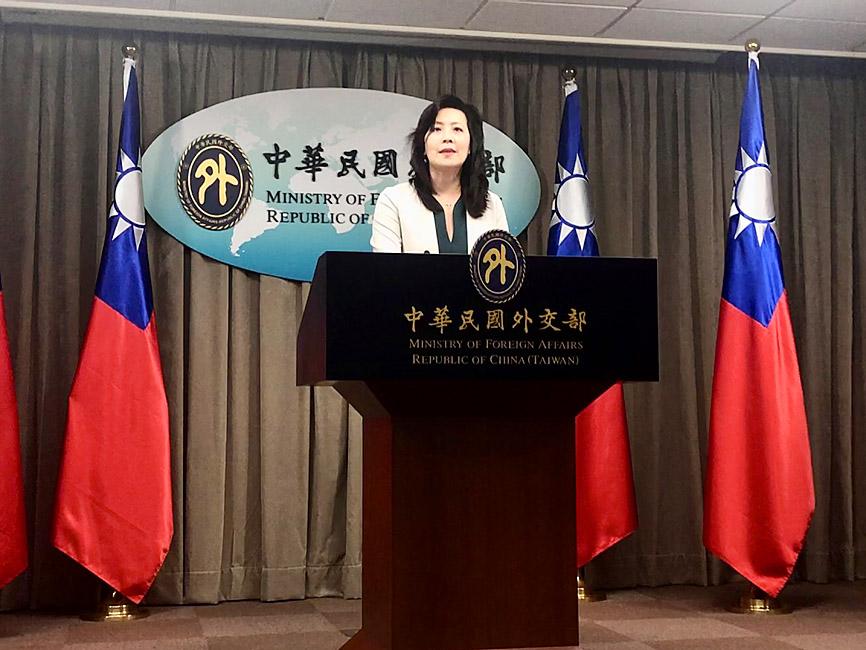China yesterday said that it would impose sanctions on Lockheed Martin Corp, days after the US approved a potential US$620 million refurbishment package for missiles to Taiwan.
The possible foreign military sale involves Patriot Advanced Capability-3 missiles.
In Taiwan, the Ministry of Foreign Affairs said that it “strongly condemns” China’s gesture, describing it as “irrational clamor and barbaric intimidation.”

Photo: Lu Yi-hsuan, Taipei Times
Taiwan’s procurement of weapons and self-defense upgrades are necessary and legitimate for defending the nation’s sovereignty and democratic establishments, as well as peace in the Taiwan Strait, ministry spokeswoman Joanne Ou (歐江安) said in a statement.
China’s ungrounded criticism cannot conceal its aggressive and authoritarian nature, nor can it sway Taiwan’s determination to reject its “one country, two systems” model, she added.
China “firmly opposes US arms sales to Taiwan,” Chinese Ministry of Foreign Affairs spokesman Zhao Lijian (趙立堅) told a regular briefing, urging Washington to abide by the concept that Taiwan is part of “one China.”
Zhao added that the US should “stop arms sales to Taiwan and cut military ties with it, so as not to do further harm to China-US relations and peace and stability across the Taiwan Strait.”
Tensions between the US and China have been increasingly strained as the two sides tussle on various fronts — ranging from the origins of the COVID-19 pandemic and China’s policies in Hong Kong, Tibet and Xinjiang.
Zhao said that China’s move to hit Lockheed with sanctions was “to safeguard its national interests.”
Last year, China threatened sanctions on US firms linked to a sale of warplanes to Taiwan as well, calling the move a serious interference in its internal affairs.
Lockheed did not immediately respond to a request for comment.
Taiwan is bolstering its defenses for what it sees as increasingly threatening moves by Beijing, such as its regular air force and naval exercises near the country.
Minister of National Defense Yen De-fa (嚴德發), visiting troops during the annual Han Kuang military exercises, said they needed to be strong in the face of “all sorts of threats and provocations” from China.
“This tells our people and the Communists that we have the confidence and ability to protect our people and homeland, and defend the country’s security,” the Ministry of National Defense quoted him as saying.
Additional reporting by Lin Chia-nan and Reuters

CHAOS: Iranians took to the streets playing celebratory music after reports of Khamenei’s death on Saturday, while mourners also gathered in Tehran yesterday Iranian Supreme Leader Ayatollah Ali Khamenei was killed in a major attack on Iran launched by Israel and the US, throwing the future of the Islamic republic into doubt and raising the risk of regional instability. Iranian state television and the state-run IRNA news agency announced the 86-year-old’s death early yesterday. US President Donald Trump said it gave Iranians their “greatest chance” to “take back” their country. The announcements came after a joint US and Israeli aerial bombardment that targeted Iranian military and governmental sites. Trump said the “heavy and pinpoint bombing” would continue through the week or as long

TRUST: The KMT said it respected the US’ timing and considerations, and hoped it would continue to honor its commitments to helping Taiwan bolster its defenses and deterrence US President Donald Trump is delaying a multibillion-dollar arms sale to Taiwan to ensure his visit to Beijing is successful, a New York Times report said. The weapons sales package has stalled in the US Department of State, the report said, citing US officials it did not identify. The White House has told agencies not to push forward ahead of Trump’s meeting with Chinese President Xi Jinping (習近平), it said. The two last month held a phone call to discuss trade and geopolitical flashpoints ahead of the summit. Xi raised the Taiwan issue and urged the US to handle arms sales to

State-run CPC Corp, Taiwan (CPC, 台灣中油) yesterday said that it had confirmed on Saturday night with its liquefied natural gas (LNG) and crude oil suppliers that shipments are proceeding as scheduled and that domestic supplies remain unaffected. The CPC yesterday announced the gasoline and diesel prices will rise by NT$0.2 and NT$0.4 per liter, respectively, starting Monday, citing Middle East tensions and blizzards in the eastern United States. CPC also iterated it has been reducing the proportion of crude oil imports from the Middle East and diversifying its supply sources in the past few years in response to geopolitical risks, expanding

Pro-democracy media tycoon Jimmy Lai’s (黎智英) fraud conviction and prison sentence were yesterday overturned by a Hong Kong court, in a surprise legal decision that comes soon after Lai was jailed for 20 years on a separate national security charge. Judges Jeremy Poon (潘兆初), Anthea Pang (彭寶琴) and Derek Pang (彭偉昌) said in the judgement that they allowed the appeal from Lai, and another defendant in the case, to proceed, as a lower court judge had “erred.” “The Court of Appeal gave them leave to appeal against their conviction, allowed their appeals, quashed the convictions and set aside the sentences,” the judges